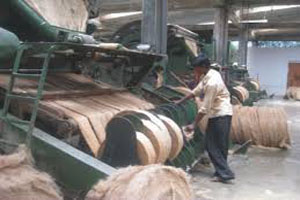
Bangladesh Central bank reluctant to give loan to jute millers from EDF funds
YarnsandFibers News Bureau 2014-09-22 11:00:00 – BangladeshBangladesh Central bank are reluctant to give jute millers loan from Export Development Fund (EDF) fund for import of capital machinery as it will impair the purpose of the fund and squeeze the number of beneficiary despite jute mills persistently pressing the bank for support from the EDF fund.
According to the bank, the EDF fund was created to promote non-traditional export business especially for importing raw-materials for manufacturing the exportable products; hence it can’t be used for other purposes. Also, if approved the jute millers will be able to get long term loans under the proposed scheme for import of capital machinery and spare parts.
The central bank is trying to develop another refinancing fund with financial assistance from the World Bank aimed at improving the capacity building of the country's export sector. The new scheme is likely to be approved at the WB's next meeting.
The central bank has already informed the Ministry of Textiles and Jute about the difficulties of using the fund for import of capital machinery and spare parts. The country's jute sector, which is passing through a hard time due to fund constraints, requested the central bank to allocate funds from the EDF to help overcome the crisis.
The central bank in a reply to the secretary of the Ministry of Textiles and Jute explained the aims and objectives for creating the fund and preconditions for getting loans from the fund. The central bank, however, informed the secretary about the proposed refinancing scheme with the WB. Discussions are going on with the WB for creating the refinancing fund, once created it would help jute millers get long term loans for import of machinery and other purposes.
The size of the fund is likely to be about USD 300 million and approved at the next meeting of the WB by early next month. The EDF facility is available to the non-traditional exporters, particularly new exporters, exporters diversifying into higher value exports and exporters exploring new markets.
Meanwhile, the Bangladesh Bank formed a Tk 2 billion (Tk 200 crore) refinance fund last year to help salvage the country's ailing jute industry, once the main foreign currency earner of Bangladesh. The central bank had also signed participatory agreements with 16 commercial banks to disburse the Tk 2 billion (Tk 200 crore) refinance fund among jute millers and traders with a view to helping them in purchasing raw jute during the current season.
Presently, the jute mills both under BJMA and BJMC (Bangladesh Jute Mills Association) have been incurring heavy losses and passing crucial time due to acute shortage of fund. Many of the mills are also facing serious problems in procuring raw jutes to run their industries mainly due to fund constraints.
The BJMA has set a target to procure about 1.1 million bales of raw jute for the FY 2014-15, according to sources. Usually mills under BJMA, BJMC and BJSA (Bangladesh Jute Spinners Association) use about 5 million bales of raw jute annually for their production. Presently, there are 238 jute manufacturing units in the country. Of these, 90 private spinning mills produce jute yarn while 18 state-owned mills under BJMC and 130 private jute mills under the BJMA manufacture hessian, sacks and bags.
Hit hard by export decline, most of the mills are suffering from inadequate amount of capital for procurement of raw jute. Banks, in some cases, are reluctant to provide funds in advance since most jute mills had defaulted on earlier loans. Often mills were found to be having a tough time repaying their debts because of lack of required net income from their current transactions. Because of the large debt burden, majority of the mills are in a financially weak position.
The falling trend of jute demands in international markets also cast some adverse impact in local markets. In spite of good crops, jute growers are also not getting fair prices for their produce this season because the cost of cultivation has gone up considerably, while there was a decline in world jute prices last year.
Export earnings from jute and jute goods declined drastically in last fiscal due to price cuts by buyers in the face of slackened demand. Exporters linked political turmoil in the Middle East, economic gloom in Europe and fear of global recession to sluggish demand for the natural fibre, the second biggest foreign currency earner after apparel.
Market Intelligence
Ask for free sample Report

experience
Customer Base
dedicated team
Countries Served Worldwide









